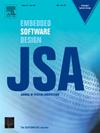联邦学习中非单调访问结构集合交集的多客户端功能加密
IF 4.1
2区 计算机科学
Q1 COMPUTER SCIENCE, HARDWARE & ARCHITECTURE
引用次数: 0
摘要
基于云服务器的联邦学习(FL)是一种分布式机器学习框架,它允许聚合器和多个客户端在不交换数据的情况下协作训练共享模型。考虑到训练数据的机密性,提出了几种使用功能加密(FE)的方案。但是,现有的方案无法表达复杂的访问控制策略。为了实现更灵活、更细粒度的访问控制,本文提出了一种多客户端非单调访问结构集合交集的功能加密方案(MCFE-SI-NAS),该方案中多个客户端在没有任何交互的情况下独立地对各自的私有数据进行加密。所有的密文都与一个标签相关联,可以抵抗“混合匹配”攻击。Aggregator可以聚合密文并输出任意两个客户端明文的集合交集,但不能学习其他任何内容。我们首先形式化了MCFE-SI-NAS方案的定义和安全模型,并建立了一个基于非对称素阶对的具体结构。设计方案的安全性得到了正式证明。此外,我们还实现了我们的MCFE-SI-NAS方案,并提供了效率分析。本文章由计算机程序翻译,如有差异,请以英文原文为准。

Multi-client functional encryption for set intersection with non-monotonic access structures in federated learning
Federated learning (FL) based on cloud servers is a distributed machine learning framework which allows an aggregator and multiple clients to train collaboratively a shared model without exchanging data. Considering the confidentiality of training data, several schemes employing functional encryption (FE) have been presented. However, existing schemes cannot express complex access control policies. In this paper, to realize more flexible and fine-grained access control, we propose a multi-client functional encryption scheme for set intersection with non-monotonic access structures (MCFE-SI-NAS), where multiple clients encrypt their private data independently without any interaction. All ciphertexts are associated with a tag, which can resist “mix-and-match” attacks. Aggregator can aggregate ciphertexts and output the set intersection of any two clients’ plaintexts, but cannot learn anything else. We first formalize the definition and security model for the MCFE-SI-NAS scheme and build a concrete construction based on asymmetric prime-order pairings. The security of the designed scheme is formally proven. Furthermore, we implement our MCFE-SI-NAS scheme and provide its efficiency analysis.
求助全文
通过发布文献求助,成功后即可免费获取论文全文。
去求助
来源期刊

Journal of Systems Architecture
工程技术-计算机:硬件
CiteScore
8.70
自引率
15.60%
发文量
226
审稿时长
46 days
期刊介绍:
The Journal of Systems Architecture: Embedded Software Design (JSA) is a journal covering all design and architectural aspects related to embedded systems and software. It ranges from the microarchitecture level via the system software level up to the application-specific architecture level. Aspects such as real-time systems, operating systems, FPGA programming, programming languages, communications (limited to analysis and the software stack), mobile systems, parallel and distributed architectures as well as additional subjects in the computer and system architecture area will fall within the scope of this journal. Technology will not be a main focus, but its use and relevance to particular designs will be. Case studies are welcome but must contribute more than just a design for a particular piece of software.
Design automation of such systems including methodologies, techniques and tools for their design as well as novel designs of software components fall within the scope of this journal. Novel applications that use embedded systems are also central in this journal. While hardware is not a part of this journal hardware/software co-design methods that consider interplay between software and hardware components with and emphasis on software are also relevant here.
 求助内容:
求助内容: 应助结果提醒方式:
应助结果提醒方式:


